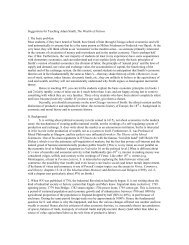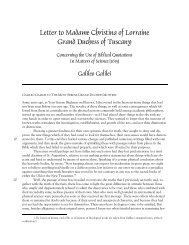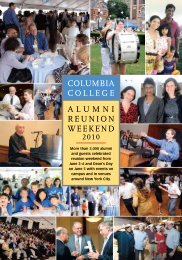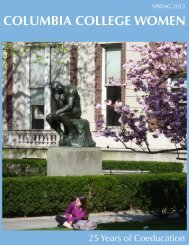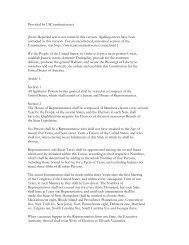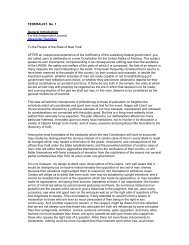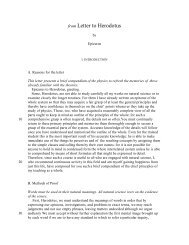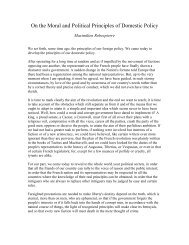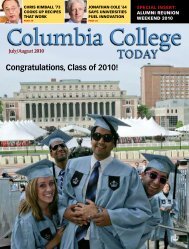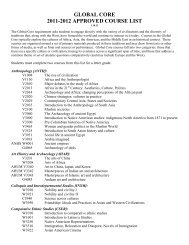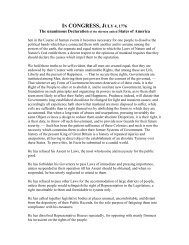Download this issue as a PDF - Columbia College - Columbia ...
Download this issue as a PDF - Columbia College - Columbia ...
Download this issue as a PDF - Columbia College - Columbia ...
Create successful ePaper yourself
Turn your PDF publications into a flip-book with our unique Google optimized e-Paper software.
DAVID DENBY ’65, ’66J<br />
COLUMBIA COLLEGE TODAY<br />
COLUMBIA COLLEGE TODAY DAVID DENBY ’65, ’66J<br />
magazine, a husband and father, a settled man who w<strong>as</strong> nevertheless<br />
unsettled in some way that may not have been any clearer<br />
to me than it w<strong>as</strong> to them. W<strong>as</strong> it just knowledge I wanted I had<br />
read many of the books before. Yet the students may have noticed<br />
that nothing in life seemed more important to me than reading<br />
those books and sitting in on those discussions.<br />
The project began when my wife suggested that I put<br />
up or shut up. In 1989 or 1990, somewhere back there,<br />
Cathleen Schine and I were reading, with incre<strong>as</strong>ing<br />
amazement, the debate about the nature of higher education<br />
in <strong>this</strong> country. Merely reciting the cliches of the debate<br />
now induces a blue haze of ex<strong>as</strong>peration and boredom: What<br />
role should the Western cl<strong>as</strong>sics and a “Eurocentric” curriculum<br />
play in a country whose population w<strong>as</strong> made up of people from<br />
many other places besides Europe — for instance, descendants<br />
of African slaves and American Indians Should groups formerly<br />
without much power — women, <strong>as</strong> well <strong>as</strong> minorities — be<br />
<strong>as</strong>ked to read through a curriculum dominated by works written<br />
by Dead White European Males<br />
The questions were not in themselves unre<strong>as</strong>onable, but it<br />
now seems hard to believe that anyone above sixteen could possibly<br />
have used, <strong>as</strong> a term of blame, the phr<strong>as</strong>e “Dead White European<br />
Males.” The words have already taken on a quaint period<br />
feel, <strong>as</strong> moldy <strong>as</strong> the love beads that I wore once, in the spring<br />
of 1968, and then flung into the back of a dresser drawer. Such<br />
complaints, which <strong>issue</strong>d generally from the academic left, especially<br />
from a variety of feminist, Marxist, and African-American<br />
scholars, were answered in turn by conservatives with resoundingly<br />
grandiose notions of the importance of the Western tradition<br />
for American national morale. In their consecutive stints <strong>as</strong><br />
chair of the National Endowment for the Humanities, William<br />
Bennett and Lynne V. Cheney said some good things about the<br />
centrality of the humanities in the life of an educated person. But<br />
the clear implication of their more polemical remarks w<strong>as</strong> that if<br />
we ce<strong>as</strong>ed to read the right books, we could not keep Communism<br />
or relativism — or whatever threatened the Republic — at<br />
the gates. There were national, even geopolitical considerations<br />
at stake. Literature had become a matter of policy.<br />
As I made my way through the debate, I began to suffer from an<br />
incre<strong>as</strong>ing sense of unreality. Thirty years earlier, I had enjoyed Lit<br />
Hum and C.C. a great deal, but then had largely forgotten them, <strong>as</strong><br />
one forgets most college courses one takes. Exactly how the books<br />
for the courses had remained in my mind, <strong>as</strong> a residue of impressions<br />
and a framework of t<strong>as</strong>te and sensibility, and even of action,<br />
I could not say. That w<strong>as</strong> the mystery, w<strong>as</strong>n’t it — the mystery<br />
of education. Exactly how does it matter to us The participants<br />
in the debate, however, seemed to know. They made extravagant<br />
claims for or against the books and the Western tradition the books<br />
embodied. At the same time, they discussed the books themselves<br />
— works of literature, philosophy, and political theory — in an<br />
unple<strong>as</strong>antly featureless and abstract way that turned them into<br />
mere clubs and spears in an ideological war. Shakespeare an agent<br />
of colonialism Rousseau part of the “hegemonic discourse” The<br />
Greek cl<strong>as</strong>sics a bulwark of democracy W<strong>as</strong> it really literature<br />
and philosophy that people were discussing in such terms One<br />
had the uncanny sense that at le<strong>as</strong>t some of the disputants hadn’t<br />
bothered to read the books in question in more than twenty years.<br />
Could such cl<strong>as</strong>sic works actually be <strong>as</strong> boring <strong>as</strong> the right — or <strong>as</strong><br />
wicked <strong>as</strong> the left — w<strong>as</strong> making them sound The books themselves<br />
had been robbed of body and flavor. And in so many of the<br />
polemics, the act of reading itself had become hollowed out —<br />
emptied of its place in any reader’s life, its stresses and ple<strong>as</strong>ures,<br />
its boredom, its occ<strong>as</strong>ional euphoria. It had lost its special character<br />
of solitude and rapture.<br />
Yet strange <strong>as</strong> the debate seemed to me, it had a galvanizing<br />
effect. For months, I w<strong>as</strong> angry and even pained. I felt I had been<br />
cheated of something, and it didn’t take long to realize why. If<br />
some of the disputants appeared to be far away from the books in<br />
question, I knew that I w<strong>as</strong> far away from them, too. I had read, I<br />
had forgotten, and I felt the loss <strong>as</strong> I did the loss of an old friend<br />
who had faded away.<br />
I worked myself into a high state of indignation, and Cathy,<br />
both a novelist and a reader, shared my view but grew tired of<br />
my outrage. There she sat in our apartment in New York, reading<br />
book after book, in bed, in the living room, at the chair by<br />
the living-room window. Often she read with a cat in her lap, the<br />
animal happily purring; its mistress, lost in her reading, scratched<br />
its head for hours. My wife w<strong>as</strong> too kind, and perhaps too busy,<br />
to point out something that later seemed obvious: I had become<br />
something of a nonreader myself; or, let us say, a reader of journalism,<br />
public-affairs books, and essays on <strong>this</strong> or that. “If you’re<br />
so upset about <strong>this</strong>,” Cathy finally said, “why don’t you take your<br />
<strong>Columbia</strong> courses again”<br />
Thus the revenge of the reader on the nonreader: why don’t<br />
you read and stop complaining Certainly the means to answer<br />
my questions lay at hand. <strong>Columbia</strong> w<strong>as</strong> only a couple of miles<br />
from my apartment on the West Side of Manhattan. And the<br />
courses, though somewhat different in their selection of texts,<br />
had not changed much in conception.<br />
Reading “the great books” may seem an odd solution to a<br />
“midlife crisis” or a crisis of identity, or whatever it w<strong>as</strong>. Why not<br />
travel or hunt elephants Ch<strong>as</strong>e teenage girls Live in a mon<strong>as</strong>tery<br />
These, I believe, are the traditional methods — for men, at<br />
le<strong>as</strong>t — of dealing with such problems. But if I wanted adventure,<br />
I wanted it in a way that made sense for me. Reading seriously,<br />
I thought, might be one way of ending my absorption in media<br />
life, a way of finding the edges again.<br />
But why not just sit and read Why go back to <strong>Columbia</strong> Because<br />
I wanted to see how others were reading — or not reading.<br />
The students had grown up living in the media. What were they<br />
like What had happened to teaching in the age of the culture debate,<br />
in a corner of the university far from the war yet obviously<br />
touched by the noise of battle One way of dispelling the crudities<br />
and irrelevancies of the “culture wars” w<strong>as</strong> to find out what<br />
actually went on in cl<strong>as</strong>srooms.<br />
And I wanted to add my words to the debate from the ground<br />
up, beginning and ending in literature, never leaving the books<br />
themselves.<br />
I<br />
had forgotten. I had forgotten the extremity of its cruelty<br />
and tenderness, and, reading it now, turning The Iliad open<br />
anywhere in its 15,693 lines, I w<strong>as</strong> shocked. A dying word,<br />
“shocked.” Few people have been able to use it well since<br />
Claude Rains so famously said, “I’m shocked, shocked to find<br />
that gambling is going on here,” <strong>as</strong> he pocketed his winnings in<br />
C<strong>as</strong>ablanca. But it’s the only word for excitement and alarm of <strong>this</strong><br />
intensity. The brute vitality of the air, the magnificence of ships,<br />
wind, and fires; the raging battles, the plains charged with terrified<br />
horses, the be<strong>as</strong>ts unstrung and falling; the warriors flung<br />
I began to suffer from an incre<strong>as</strong>ing sense of unreality.<br />
Thirty years earlier, I had enjoyed Lit Hum and C.C.<br />
a great deal, but then had largely forgotten them,<br />
<strong>as</strong> one forgets most college courses one takes.<br />
facedown in the dust; the ravaged longing for home and family<br />
and meadows and the rituals of peace, leading at l<strong>as</strong>t to an instant<br />
of reconciliation, when even two men who are bitter enemies fall<br />
into rapt admiration of each other’s nobility and beauty — it is<br />
a war poem, and in the Richmond Lattimore translation it h<strong>as</strong><br />
an excruciating vividness, an obsessive observation of horror that<br />
causes almost disbelief.<br />
Simoeisios in his stripling’s beauty, whom once his mother<br />
descending from Ida bore beside the banks of Simoeis<br />
when she had followed her father and mother to tend the<br />
sheepflocks.<br />
Therefore they called him Simoeisios; but he could not<br />
render again the care of his dear parents; he w<strong>as</strong> shortlived,<br />
beaten down beneath the spear of high-hearted Ai<strong>as</strong>,<br />
who struck him <strong>as</strong> he first came forward beside the nipple<br />
of the right bre<strong>as</strong>t, and the bronze spearhead drove clean<br />
through the shoulder.<br />
He dropped then to the ground in the dust, like some black<br />
poplar … (IV, 472-82)<br />
The nipple of the right bre<strong>as</strong>t. Homer in his terrifying exactness<br />
tells us where the spear comes in and goes out, what limbs are severed;<br />
he tells us that the dead will not return to rich soil, they will<br />
not take care of elderly parents, receive ple<strong>as</strong>ure from their young<br />
wives. His explicitness h<strong>as</strong> a finality beyond all illusion. In the end,<br />
the war (promoted by the gods) will consume almost all of them,<br />
Greeks and Trojans alike, sweeping on year after year, in battle after<br />
battle — a mystery in its irresistible momentum, its profoundly<br />
absorbing moment-to-moment activity and overall meaninglessness.<br />
First one side drives forward, annihilates hundreds, and is on<br />
the edge of victory. Then, a few days later, inspired by some god’s<br />
trick or phant<strong>as</strong>m — a prod to the sluggish brain of an exhausted<br />
warrior — the other side recovers, advances, and carries all before<br />
it. When the poem opens, <strong>this</strong> movement back and forth h<strong>as</strong> been<br />
going on for more than nine years.<br />
The teacher, a small, compact man, about sixty, walked<br />
into the room, and wrote some initials on the board:<br />
W A S P<br />
D W M<br />
W C<br />
D G S I<br />
While most of us tried to figure them out (I had no trouble<br />
with the first two, made a lame joke to myself about the third,<br />
and w<strong>as</strong> stumped by the fourth), he turned, looking around the<br />
cl<strong>as</strong>s, and said ardently, almost imploringly, “We’ve only got a<br />
year together. … ” His tone w<strong>as</strong> pleading and mournful, a lover<br />
who feared he might be thwarted. There w<strong>as</strong> an alarming pause.<br />
A few students, embarr<strong>as</strong>sed, looked down, and then he said:<br />
“This course h<strong>as</strong> been under attack for thirty years. People have<br />
said” — pointing to the top set of initials — “the writers are all<br />
white Anglo-Saxon Protestants. It’s not true, but it doesn’t matter.<br />
They’ve said they were all Dead White Males; it’s not true,<br />
but it doesn’t matter. That it’s all Western civilization. That’s not<br />
quite true either — there are many Western civilizations — but it<br />
doesn’t matter. The only thing that matters is <strong>this</strong>.”<br />
He looked at us, then turned back to the board, considering<br />
the initials “DGSI” carefully, respectfully, and rubbed his chin.<br />
“Don’t Get Sucked In,” he said at l<strong>as</strong>t. Another pause, and I notice<br />
the girl sitting next to me, who h<strong>as</strong> wild frizzed hair and a<br />
m<strong>as</strong>s of acne on her chin and forehead, opening her mouth in<br />
panic. Others were smiling. They were freshmen — sorry, firstyear<br />
students — and not literature majors necessarily, but a crosssection<br />
of students, and therefore future lawyers, accountants,<br />
teachers, businessmen, politicians, TV producers, doctors, poets,<br />
layabouts. They were taking Lit Hum, a required course that almost<br />
all students at <strong>Columbia</strong> take the first year of school. This<br />
may have been the first teacher the students had seen in college.<br />
He w<strong>as</strong>n’t making it e<strong>as</strong>y on them.<br />
“Don’t get sucked in by false ide<strong>as</strong>,” he said. “You’re not here<br />
for political re<strong>as</strong>ons. You’re here for very selfish re<strong>as</strong>ons. You’re<br />
here to build a self. You create a self, you don’t inherit it. One<br />
way you create it is out of the p<strong>as</strong>t. Look, if you find The Iliad dull<br />
or invidious or a glorification of war, you’re right. It’s a poem in<br />
your mind; let it take shape in your mind. The women are honor<br />
gifts. They’re war booty, like tripods. Less than tripods. If any<br />
male reading <strong>this</strong> poem treated women on campus <strong>as</strong> chattel, it<br />
would be very strange. I also trust you to read <strong>this</strong> and not go out<br />
and hack someone to pieces.”<br />
Ah, a hipster, I thought. He admitted the obvious charges in<br />
order to minimize them. And he said nothing about transcendental<br />
values, supreme m<strong>as</strong>terpieces of the West, and the rest of<br />
that. We’re here for selfish re<strong>as</strong>ons. The voice w<strong>as</strong> ple<strong>as</strong>ant but odd<br />
— baritonal, steady, but with traces of mockery garlanding the<br />
short, definitive sentences. The intonations drooped, <strong>as</strong> if he were<br />
laying black crepe around his words. A hipster wit. He nearly<br />
droned, but there were little surprises — ide<strong>as</strong> insinuated into<br />
corners, a sudden expansion of feeling. He had sepulchral charm,<br />
like one of Shakespeare’s solemnly antic clowns.<br />
I remembered him well enough: Edward “Ted” Tayler, professor<br />
of English. I had taken a course with him twenty-nine years<br />
earlier (he w<strong>as</strong> a young <strong>as</strong>sistant professor then), a course in<br />
seventeenth-century Metaphysical poetry, which w<strong>as</strong> then part<br />
of the sequence required for English majors at <strong>Columbia</strong>, and I<br />
recalled being baffled <strong>as</strong> much <strong>as</strong> intrigued by his manner, which<br />
definitely tended toward the cryptic. He w<strong>as</strong> obviously brilliant,<br />
SPRING 2013<br />
36<br />
SPRING 2013<br />
37



